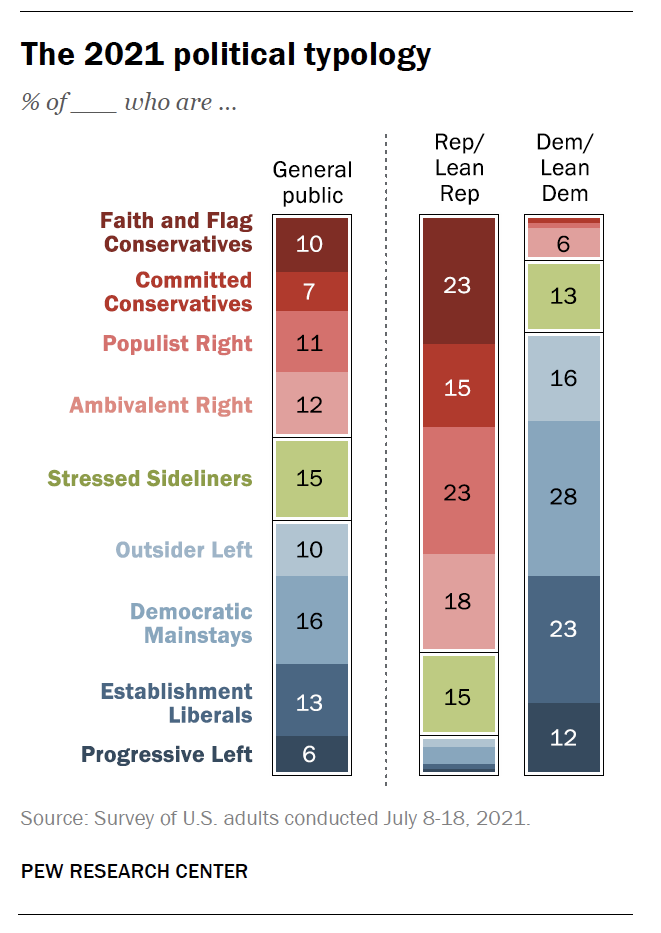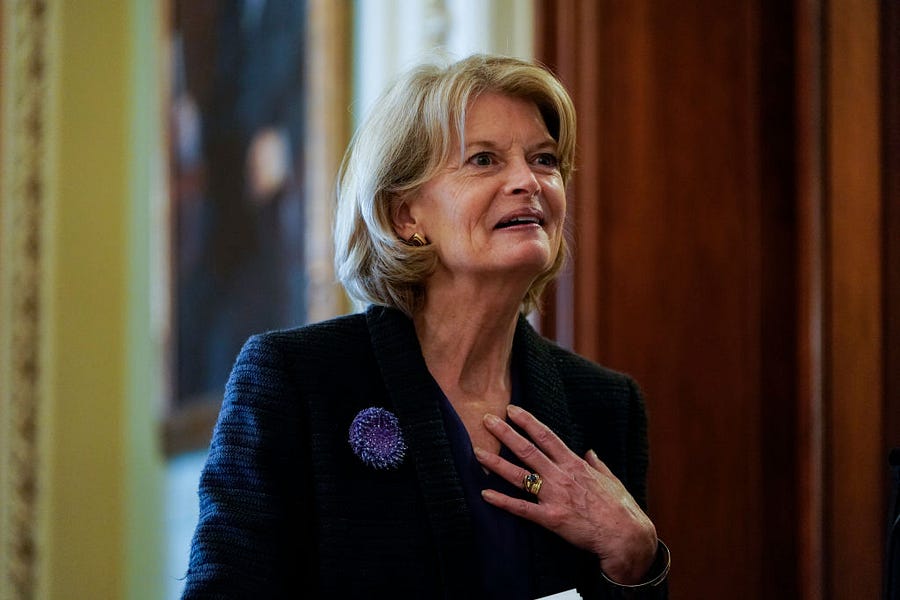Campaign Quick Hits
Murkowski In, Leahy Out: Alaska Sen. Lisa Murkowski announced that she is seeking reelection. Things could get messy for the only Republican senator who voted to convict former President Donald Trump at his impeachment trial to face reelection next year. The Alaska GOP—and Trump—have already endorsed her primary challenger. But Murkowski is uniquely immune to such threats. In 2010, Murkowski lost the GOP primary to a tea party challenger and won as a write-in candidate in the general election.
Vermont Sen. Patrick Leahy, on the other hand, announced that he would retire at the end of his term, leaving Democrats to defend the open seat. Leahy and Bernie Sanders may both be staunch liberals but Vermont reelected Republican Gov. Phil Scott to a third term in 2020 with nearly 70 percent of the vote. Of course, Republicans would need a viable candidate to put the seat into play and Scott has made clear that it’s not going to be him.
Beto Is Back: Former congressman and erstwhile presidential candidate Beto O’Rourke announced that he is running against Greg Abbott for Texas governor. In 2018, O’Rourke attracted national attention (and money) running against Ted Cruz. He lost by just under 3 points, but he was credited with energizing the Texas Democratic Party and breaking fundraising records with an eye-popping $80 million haul. Shortly after, though, O’Rourke pivoted left in his run for the Democratic nomination for president. And while Abbott’s numbers in the state aren’t great, Beto’s are worse. A University of Texas poll from last month found Abbott’s job approval at only 43 percent, but O’Rourke’s favorables were nearly 10 points lower while fully 50 percent said they had an unfavorable opinion of him.
As for campaign strategy, O’Rourke announced his bid in a video and an exclusive with Texas Monthly—a magazine ubiquitous in chi-chi waiting rooms across the state that is perhaps best known for having its own barbecue editor. I actually think this highlights something I’ve long thought—splashy, expensive announcements are overrated. You need to get the word out and that’s about it. Big events have as much chance of backfiring as anything else.
To say that O’Rourke is climbing uphill is an understatement. If Virginia and New Jersey didn’t provide enough evidence, longtime Democratic Texas House member Ryan Guillen switched parties on the same day as O’Rourke’s announcement. Guillen said he left the Democratic Party because “the ideology of defunding the police, of destroying the oil and gas industry and the chaos at our border is disastrous for those of us who live here in South Texas.”
Stop the Primary Steal: Doug Heye, former Republican operative, wrote a thought-provoking op-ed for the Washington Post. His point was that Republicans may think it’s all fun and games to echo Trump’s election rigging claims, but “this new trend could easily backfire on the party — if candidates start falsely insisting that caucuses and primaries, as well as general elections, have been stolen from them.” Does the Republican Party have a plan when every candidate on the losing end of a Senate primary starts claiming that the GOP stole their election too?
It’s Another Political Quiz: Pew Research Center has broken down the American electorate into nine distinct groups. The point is that we often see our political disagreements through the lens of R vs D, but “the gulf that separates Republicans and Democrats sometimes obscures the divisions and diversity of views that exist within both partisan coalitions—and the fact that many Americans do not fit easily into either one.” So, what are you? (Very curious to see where the comments section takes this one.)

Election Fraud Writ Large: I’ve written extensively about the difficulty of pulling off large scale election fraud at, say, a presidential level. But, of course, we know that election fraud on a smaller scale isn’t just possible. In their new book, The Vote Collectors: The True Story of the Scamsters, Politicians, and Preachers behind the Nation’s Greatest Electoral Fraud,
Michael Graff and Nick Ochsner tell the story of the 2018 election fraud scandal in North Carolina that cost Republicans a house seat and showcased how absentee ballots have always been a target for election fraud—on both sides of the political spectrum.
In The Vote Collectors, Michael Graff and Nick Ochsner tell the story of the political shenanigans in Bladen County, exposing the shocking vulnerability of local elections and explaining why our present systems are powerless to monitor and prevent fraud. In their hands, this tale of rural corruption becomes a fascinating narrative of the long clash of racism and electioneering—and a larger story about the challenges to democracy in the rural South. At a time rife with accusations of election fraud, The Vote Collectors shows the reality of election stealing in one southern county, where democracy was undermined the old-fashioned way: one absentee ballot at a time.
How’s the Gerrymander Going: New York Times reporters Reid J. Epstein and Nick Corasaniti wrote up a great primer on how redistricting is leaving the 2020 map even less competitive—and more Republican—than ever before. As they note, “Republicans have control over the redistricting process in states that represent 187 congressional seats, compared with just 84 for Democrats” and the result is that “Republicans have added a net of five seats.” They also explain the basics of how map drawing works to partisan advantage:
Gerrymandering is carried out in many ways, but the two most common forms are “cracking” and “packing.” Cracking is when mapmakers spread a cluster of a certain type of voters — for example, those affiliated with the opposing party — among several districts to dilute their vote. Packing is when members of a demographic group, like Black voters, or voters in the opposing political party, are crammed into as few districts as possible.
Audrey ran into Rick Scott, Florida senator and chairman of the GOP’s senatorial campaign committee, to get his take on how candidate recruitment is going. Here’s what he said.
Hogan in the Hot Seat
In a major blow to the National Republican Senatorial Committee, GOP Gov. Chris Sununu of New Hampshire announced last week that he will not run for U.S. Senate in 2022. The news came one week after Republican Glenn Youngkin defeated Democrat Terry McAuliffe in Virginia’s closely watched governor’s contest, an off-year victory that has made Republicans bullish about their chances of flipping both the House and the Senate next year.
In a bid to retake the Senate, Republicans are setting their sights on candidates who have insisted publicly that they are not interested in running, including Maryland Gov. Larry Hogan. Sources close to Hogan say that national Republicans have ramped up their recruitment efforts after Youngkin’s win, and even more so after Sununu announced he would not run.
“That pressure campaign has been pretty high,” a source familiar with Hogan’s thinking told The Dispatch, adding that recruitment pressure ranges from donors to national Republicans like GOP Sens. Rick Scott and Mitch McConnell. “He’s listening to those people,” the source said. “But he’s been pretty clear he’s not interested in it.”
Scott, chairman of the NRSC, insists he is optimistic about GOP recruitment efforts ahead of the midterms. “I have lots of conversations, you never know exactly what people are going to do,” Scott told The Dispatch Tuesday when asked about Hogan’s chances of running for U.S. Senate. “Nobody ever says ‘Oh, yeah, I’m 80 percent there.’”
In the meantime, all eyes are on states like Maryland and Vermont, where the right candidate will make the difference between putting a state in play for the GOP and leaving it in Democratic hands.
As usual, Chris is here to explain everything so refill that mug of hot cocoa, sit back, and let the wisdom pour over you.
Dems’ Permanent Pandemic Mindset Deepens Midterm Gap
Never underestimate the human capacity for self-deception when it comes to partisans on both sides reading polls.
Sometimes they look for the pony in the pile of horse manure: “We may be down 20 points since last month but look at those numbers among unmarried, left-handed, Filipino-American women! What’s Tagalog for ‘comeback,’ y’all?” Other times, partisans embrace the suck but draw self-serving conclusions: “Voters’ disdain for our side is proof that moderation is the problem. We must smash our radical agenda into their faces like a grapefruit until they agree!”
We’ve gotten to see more of the latter than the former this fall as Democrats have confronted some grisly truths about their standing. At the start of the swoon in late summer, Democrats mostly focused on what was wrong with President Biden—he was too much or too little of what various factions inside the party wanted or didn’t want, he had a “messaging problem,” etc. But lately, especially since the high-profile Virginia gubernatorial election, more members of the blue team are acknowledging their party’s collective problem.
This week’s Washington Post/ABC News poll has been a big, fat exclamation point for Democrats. Biden’s approval rating in the poll, 38 percent among registered voters, is quite poor, but on par with other recent polls. What has really caught Democrats’ attention, though, has been their 10-point deficit on the question of which party’s candidate voters prefer for next year’s midterm elections. Republicans had their first-ever outright majority in the poll’s 40 years of asking the “generic ballot” question. They beat the previous all-time high for Republicans on the question, which came in the wake of the 9/11 attacks.
While there’s no reason to believe that the Republican advantage would necessarily hold at such a high level, such a landslide would result in a gain of more than 45 seats in the House and a Republican majority bigger than the congressional GOP’s Obama-era heyday. Given the Republican advantages in midterm turnout trends, gerrymandering, and low-density rural districts, even a tie in the generic ballot points to a Republican advantage. Ten points would be a bloodbath for Democrats. And while the Post’s poll is worse than other recent surveys for Dems, it’s broadly in line with what else we’re seeing. Last week’s survey from USA Today put Democrats down 8 points.
So what should Democrats take from their glimpse into the gaping maw of a midterm catastrophe? To the Post’s own James Downie there is “a screamingly obvious remedy.” He writes that—wait for it—it’s time for what he calls “conservative” Democrats to stop impeding passage of the social welfare spending package long sought by Bernie Sanders and other progressive members of Congress.
While it is true that 54 percent of voters favored what pollsters flatteringly described as a $2 trillion package to “address climate change and to create or expand preschool, health care and other social programs,” the idea that Democrats and independents frustrated by a lack of bold action are planning to vote Republican is extremely silly. The same poll said 62 percent of voters were concerned Biden would “do too much to increase the size and role of government in U.S. society.”
Downie and many others on the left who point to Democratic frustrations with a lack of progressive victories are right to a degree when it comes to voter intensity. That could explain some of Biden’s disapproval quagmire but none of why so many independents would prefer Republicans take control of Congress. That is no mystery, though. It may even be “screamingly obvious.”
Voters’ estimation of the health of the economy—which is actually growing and adding jobs like gangbusters—was worse than during the economic collapse of the peak pandemic and is lower than any point since 2014. Voters don’t care about GDP and jobs reports. They care about their own circumstances. With prices surging and many goods unavailable, few people feel like happy days are here again. Accordingly, estimations of how Biden, and by extension, his party are handling the economy have declined 13 points since April. That almost precisely mirrors his overall slide in job approval.
But there’s a steeper slide that points to the swing among independent voters. In April, 64 percent of adults told Post pollsters they approved of how Biden was handling the coronavirus pandemic. Now it’s 47 percent, a 17-point drop. Whatever mistakes Biden has made on this front, he hasn’t gotten here by himself. Democrats on the state and local levels have damaged the party’s once respected brand on coronavirus response. As we saw in the contests in New Jersey and Virginia, persuadable voters are clearly frustrated with restrictive policies that have persisted even after vaccines became universally available. The availability of potent antivirals will eliminate the argument for all but the most specific, narrow restrictions. While it is true that we may never be entirely shed of coronavirus, we are also reaching a point where COVID can be brought to heel.
Pandemic fatigue is a major part of what’s driving voters into the arms of the GOP. If Democrats maintain the belief that one day the virus will be forever banished, they will continue to face a backlash. Some are figuring this out. Colorado Gov. Jared Polis, for example, has refused to reimpose mask mandates and capacity limits in the face of the ongoing surge in the Mountain West. His response, despite considerable pressure, has been to stop protecting the unvaccinated from themselves and keep the focus on shots—including boosters—rather than masks.
Republicans who were worried about how coronavirus would affect their party and then-President Donald Trump’s chances in 2020 should have been leading the charge to stop the spread in the early days. But they couldn’t bring themselves to do it, and their party paid the price as voters deemed Trump and the GOP unserious about the threat. But as the threat recedes, it is Democrats who need to push themselves outside of their cultural comfort zones and support opening back up.











Please note that we at The Dispatch hold ourselves, our work, and our commenters to a higher standard than other places on the internet. We welcome comments that foster genuine debate or discussion—including comments critical of us or our work—but responses that include ad hominem attacks on fellow Dispatch members or are intended to stoke fear and anger may be moderated.